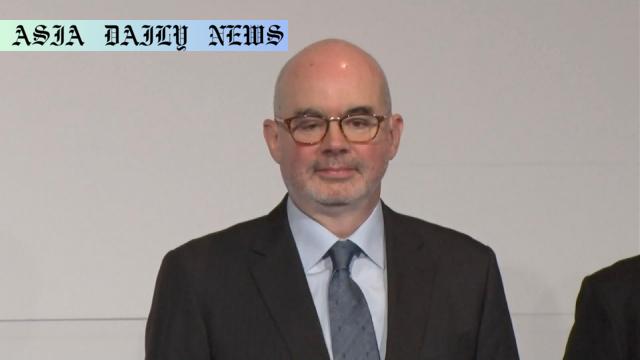Taiwan: President Lai announced heightened measures against Chinese espionage, promising stronger democratic partnerships.

Taiwan’s Increasing Espionage Concerns
The persistent threat of espionage has been a significant concern for Taiwan, especially given rising tensions with China. Over recent years, dozens of Taiwanese military personnel, both active-duty and retired, have been accused of spying for Beijing. The revelations of these activities have not only alarmed Taiwan but also highlighted the need for immediate and comprehensive countermeasures. Strengthening national security has become a top priority for the administration led by President Lai Ching-te, who has publicly committed to addressing this issue head-on.
During his speech at an international forum in Taipei, President Lai reiterated his administration’s dedication to collaborating with global democratic partners to counter the challenges posed by what he described as expanding authoritarianism. Taiwan sees Chinese espionage as just one facet of a broader strategy aimed at undermining the integrity of its democratic institutions, territorial sovereignty, and economic autonomy. This renewed focus on espionage showcases Taiwan’s resolve to preserve its democratic identity amidst mounting pressure from a powerful neighbor.
US Support: A Strategic Partnership
The United States, represented by the Director of the American Institute in Taiwan, Raymond Greene, has confirmed its support for Taiwan’s anti-espionage initiatives. Greene lauded Taiwan’s proactive efforts, highlighting how President Lai’s agenda to confront espionage will further deepen the collaboration between the two sides. This endorsement signifies the US’s growing partnership with Taiwan as part of its Asia-Pacific strategy. Greene also pointed out how economic cooperation, particularly involving Taiwan Semiconductor Manufacturing Company’s (TSMC) major investments in the US, will concurrently strengthen the economic and security relationship between the nations. The synergy between national security and economic growth underscores how the US and Taiwan are aligning their goals to achieve mutual benefits and safeguard international democratic values.
Democracy versus Authoritarianism
An essential element of President Lai’s message was the dichotomy between democratic values and the pressures of expanding authoritarian states. Lai emphasized Taiwan’s role in standing as a bulwark against such forces within the region. With regular military activities near Taiwan’s borders and attempts to infiltrate its political and economic systems, China has demonstrated an aggressive stance toward the small island nation. Taiwan, therefore, aims to fortify its partnerships with like-minded countries that share its values and vision for a peaceful, democratic future. This endeavor reflects larger geopolitical currents, as countries around the world navigate the complex relationship between safeguarding sovereignty and engaging diplomatically with powerful, authoritarian states.
The Economic Dimension
While the immediate focus might be Taiwan’s heightened response to Chinese espionage, the economic relationship between Taiwan and the US underscores another critical dimension of this partnership. Taiwan Semiconductor Manufacturing Company (TSMC), a global leader in chip manufacturing, recently unveiled plans for a significant investment in the United States. This move not only strengthens bilateral economic ties but also positions both nations to better withstand challenges in global supply chain disruptions, particularly in semiconductor production. Partnerships such as this showcase how economic resilience and innovation coincide with security needs, creating a robust foundation for shared prosperity. These developments suggest that Taiwan is combining economic strategy with its defense and foreign policy to maximize its global relevance and security guarantees.
Commentary
Significance of Taiwan’s Initiative
The steps taken by Taiwan to address the rising espionage threats from China mark a critical juncture in regional geopolitics. Under President Lai’s leadership, the nation has demonstrated a determination to counter external pressures while consolidating alliances with democratic partners. These efforts go beyond national security concerns; they reflect Taiwan’s larger commitment to democratic resilience amidst rising authoritarianism within its region. The coupling of its national defense strategy with broader geopolitical principles makes this initiative not just significant but also exemplary for other nations facing similar challenges.
The Role of the United States
It is worth noting the indispensable role of the United States in Taiwan’s strategic plan. The endorsement by Raymond Greene, representing American interests in Taiwan, underscores the US’s long-standing but increasingly explicit commitment to safeguarding Taiwan’s sovereignty. Beyond words of support, the deepening economic ties, such as the TSMC’s major investments, indicate a holistic approach where security and economic resilience go hand in hand. The collaboration reflects shared interests and values, promising mutual benefits while sending a strong message about democratic solidarity in the face of coercion.
Broader Implications for Global Order
Taiwan’s situation encapsulates many of the challenges confronting democracies worldwide. Its proactive stance offers a case study in effectively addressing multiple threats—espionage, economic vulnerabilities, and geopolitical aggression—under the principles of democracy and cooperation. The interplay between its domestic initiatives and international partnerships highlights an evolving, multifaceted strategy. As tensions persist in the Asia-Pacific, Taiwan’s experience will likely serve as an example for other nations to fortify their democratic institutions and alliances, striving for a balance between sovereignty, security, and international cooperation.


